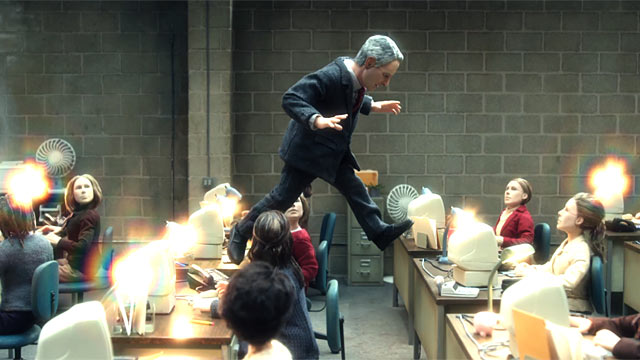Kaufmania.
“I love you so much that nothing can matter to me – not even you…” – Ayn Rand
Charlie Kaufman needs a foil to temper the moroseness of his characters and his subjects. Not only for the sake of levity and digestibility but because sometimes a point is most commanding when made indirectly. There’s an extraordinary degree of thought behind every screenplay Kaufman has every written. An auteurist might just call him an auteur, a rarity for a screenwriter, so prevailing and unique is his thumbprint in his work. But Kaufman’s screenplays have been best served by collaboration; collaborations with director Spike Jonze on Being John Malkovich and Adaptation and with director Michel Gondry on The Eternal Sunshine of the Spotless Mind. The presence of another authoritative influence on Kaufman’s words and ideas is missed in Anomalisa, as it was with Kaufman’s directorial debut, Synecdoche, New York. Jonze, in particular, has a real capacity for realising Kaufman’s material with understanding and approachability. Adversely, Kaufman’s insight might have been beneficial for Jonze’s film Her, which Jonze wrote and directed by himself.
Together, Jonze and Kaufman made one very fine film and one of the very finest of films. Separately, the professional relationship is sorely missed, particularly considering the enormous possibility for achievement of every project that they have independently pursued. Jonze lacks Kaufman’s comprehension and incredible faculty for thought. Kaufman lacks Jonze’s directorial command. And he’s dispiriting, which dampens the impact of his concepts. That melancholy that has pervaded both Kaufman’s theatrically released directorial films probably shouldn’t come as too much of a surprise from someone who engages with existentialism in his work so overwhelmingly. His films are full of ideas, but Anomalisa and Synecdoche, New York are suffocated by them. Kaufman’s positions are labored to the point of becoming overbearing. Indirect significance can often be far more powerful than strained articulation. Anomalisa sermonizes, but its argument isn’t illuminating enough to justify it.
Self-help author Michael Stone (David Thewlis) arrives in Cincinnati to promote his latest book at a customer service convention at The Fregoli Hotel. The name of the hotel is sly reference to a rare condition called the ‘Fregoli Delusion’, in which a person holds the belief that different people are the same person who changes appearance. Stone sees sameness in everyone, down to his or her identical faces and voices (all played by Tom Noonan, even the women). And then he hears a unique voice down the hall and pursues it. The voice belongs to Lisa (Jennifer Jason Leigh), a call centre worker who’s in town to hear Stone talk. Stone thinks she’s marvelous, but doesn’t know why. Neither does she. Could it be a real affiliation or is it just Stone’s loneliness mixed with the hotel bar martinis?
Perception and self-indulgence are crucial to understanding Anomalisa. Stone is a particularly narcissistic character, a trait contradicted by his ordinary physical appearance. This appearance is deliberate, because engenders an empathetic quality in Stone rather than highlights his more superficial characteristics. Stone’s attitude is that the world is the problem. But is it? Anomalisa never suggests that Stone actually suffers from the Fregoli Delusion. Instead, his perception of everyone else as the same works as a metaphor for his isolation, which leaves everyone else as one identical mass. Nevertheless, life is inherently selfish, and Anomalisa knows it.
Stone’s relationship with Lisa is intended to be the heart of the film and yet it’s not because Kaufman can’t quite humanise their situation. We know Stone is attracted to Lisa because her voice isn’t Tom Noonan’s, but that’s a concept not a connection. The scenes in which Stone and Lisa form an attachment exhibit Kaufman’s capacity for thought, not sentiment. Anomalisa wants to be a romance and it wants to be about a selfish man using a sweet woman to make himself feel better, but it can’t be both. Even if that’s the point of the film.
7/10
For more Reviews, click here. If you’re digging ReelGood, sign up to our mailing list for exclusive content, early reviews and chances to win big!

